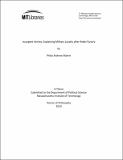Insurgent armies : explaining military loyalty after rebel victory
Author(s)
Martin, Philip Andrew, author.
Download1373623471-MIT.pdf (27.28Mb)
Alternative title
Explaining military loyalty after rebel victory
Other Contributors
Massachusetts Institute of Technology. Department of Political Science.
Advisor
Petersen, Roger
Terms of use
Metadata
Show full item recordAbstract
Why do armed movements that win civil wars sometimes build states that control their military forces, but sometimes do not? Under what conditions do field commanders within these winning coalitions commit to centralized military hierarchies, or defect and maintain parallel armed networks? Despite the importance of obedient militaries for building strong states and durable peace, the logic of military loyalty after victory in civil war has not been studied in a systematic or comparative fashion. To explain variation in ex-rebel commander behavior across and within states where armed movements seize power, my argument highlights the centrality of wartime institution-building. Threats to insurgent group survival cause variation in two types of institutions: leadership bodies that bind field commanders to political elites, and local governance systems that tie field commanders to rebel-controlled communities. These institutions shape postwar outcomes through two intervening mechanisms: a) ex-rebel commanders' expectations of reciprocity from political rulers, and b) ex-rebel commanders' abilities to mobilize supporters outside of the regular army hierarchy. If collectivized leadership institutions exist, ex-rebel commanders are more likely to trust rulers' promises and remain loyal. Otherwise, commanders' calculi will hinge on their local governance records. Ex-rebel commanders who governed well during war can tap into local support networks and resist central state oversight. To develop and test this theory, the dissertation examines the war-to-peace transitions of victorious armed movements in Africa. First, I use comparative historical analysis based on original interviews and archival materials to analyse the divergent trajectories of winning rebels in Zimbabwe and Côte d'Ivoire. Second, I test observable implications of my argument at the sub-national level in Côte d'Ivoire. For this analysis, I draw on original community-level survey evidence based on interviews with key informants in a representative sample of localities in rebel-ruled territory. Finally, I illustrate the generalizability of the argument through a medium-N analysis of winning armed movements in Africa between 1974 and the present. The project contributes to debates about war and state formation, and the design of coercive institutions in fragile states. It also challenges conventional wisdom about the positive effects of rebel institution-building for peacebuilding.
Description
Thesis: Ph. D., Massachusetts Institute of Technology, Department of Political Science, 2019 Cataloged from PDF version of thesis. Includes bibliographical references.
Date issued
2019Department
Massachusetts Institute of Technology. Department of Political SciencePublisher
Massachusetts Institute of Technology
Keywords
Political Science.